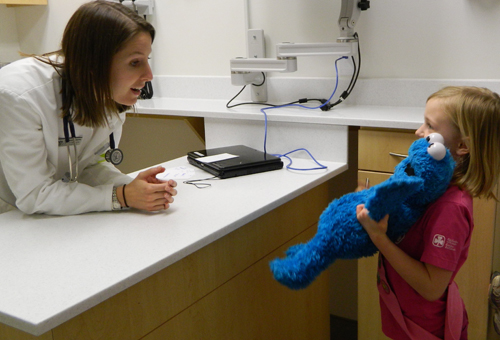
On March 27, the community room at the Hill’s Pet Nutrition Primary Healthcare Centre (PHC) was the gathering spot for the 23rd Guelph Sparks troop: 21 little girls in matching pink T-shirts clutching stuffed animals and teddy bears. OVC students set out colouring books and a certificate for each girl to decorate as they waited for the activities to begin.
Opened in 2010, PHC is an important addition to OVC: it’s a teaching hospital designed not only to provide top-notch care to the companion animals that are brought in from the community, but to help student veterinarians learn and improve their skills.
Dr. Tiffany Durzi, a veterinarian at PHC, spoke to the group about the importance of preventative health care and treatment for both animals and children. Making that connection is one of the underlying goals of these tours, she explained afterwards. “Many children are afraid of going to the doctor or to a hospital. By coming here and seeing how we work with animals, they can feel more confident,” she says. This is a new project for PHC, as the Sparks troop was the second to take a tour, but they are looking forward to hosting more visits.
Psychology professor Megan McMurtry, who also attended the event, says she is interested in conducting research on how involvement in activities like this one can reduce children’s anxieties when they need medical care.
The Sparks were divided into groups of four or five, and each group headed to an exam room with one of the student veterinarians. Joanna McPherson’s first patient was Cookie Monster. “This is the first monster we’ve had in the clinic,” she told the girls. Cookie’s upset tummy was treated with a large bandage and a heart sticker. As McPherson continued examining and treating the children’s toys (most got colourful bandages, some also received injections or medicine), she explained the use of each medical tool and involved the children in the process.
“What am I listening for when I listen to the heart?” she asked. “What sound does a heart make?” The girls were quick to respond with their own versions of heart sounds.
Following her examinations of the assorted stuffed animals (which included two elephants), McPherson took the group on a tour of the centre. She showed them the observation room where they could see, through a one-way mirror, some of their friends in the next exam room. This is used by the supervising veterinarian to observe the student veterinarians with clients.
From there, the girls were shown the laboratory section, the wet and dry rehab rooms (the girls were quite impressed with the pool, underwater treadmill and the row of dog-sized life jackets), and the doggie daycare area with its couches and individual mailboxes.
In the anaesthesia room, McPherson demonstrated how a veterinarian would use gas to put Cookie Monster to sleep before surgery, and then showed the children the operating and X-ray rooms, responding to questions along the way.
At the end of the tour, each girl received a photo of herself, her stuffed animal and the student veterinarian who led her group. The photos were attached to the certificates to remind them of their visits.
Durzi looks forward to having more of these groups visit in the future. “It’s beneficial for both the student veterinarians and the children,” she says.
Not to mention the animals, both those seen at PHC today and those who will be cared for by the students after graduation. The hands-on experience they gain here helps the students become better vets. More complex cases can be referred to specialists at the OVC Small Animal Clinic. New patients are always welcome. For more information, to book an appointment, or to arrange for a tour for your group, call 519-840-0100.